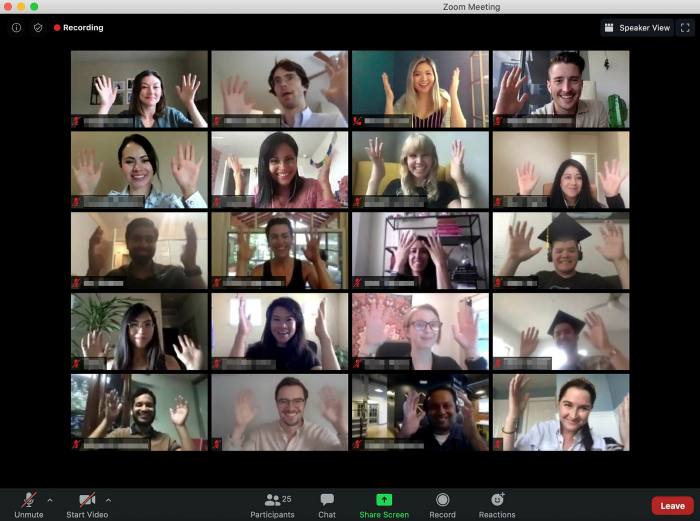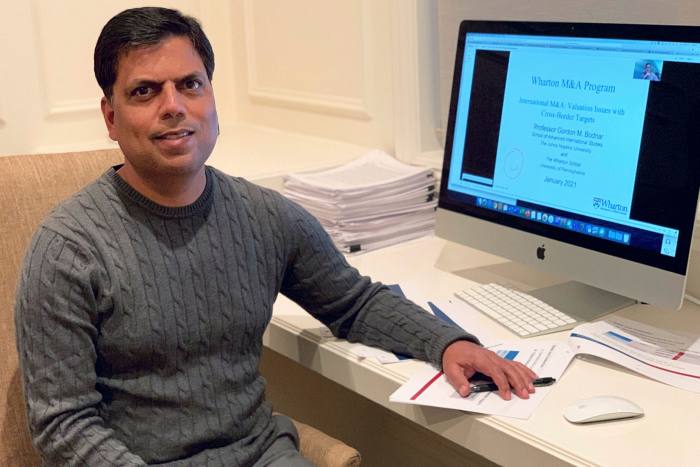Virtual classrooms democratise executive education
As universities shut their lecture rooms and firms altered to the disruption of the coronavirus pandemic final calendar year, PepsiCo’s chief finding out officer, Molly Nagler, had to scrap ideas to send executives to programmes at Wharton College and Yale College of Management.
But fairly than dismiss government instruction as impractical, unaffordable or unjustifiable during a crisis, Nagler doubled down and negotiated on-line alternate options for the US-dependent foodstuff and beverages team.
“We are inclined to use the in-particular person, campus-dependent programme for executives to generate a differentiated knowledge and expose them to chopping-edge contemplating and investigation,” she states. “We’ll still use the campus for elite ordeals but considerably less than ahead of due to the fact of the cost and the problem to get absolutely everyone in 1 location.”
Like several of her counterparts in firms all over the planet, Nagler is not chopping back on her coaching spending budget. Rather, she is reconsidering who ought to learn, what they ought to study and how ideal to prepare them — and reviewing her alternative of exterior programmes.
Coronavirus imposed a sharp shock on company schools’ non-diploma “open” courses for administrators and bespoke “custom” offerings for corporate clients. Whilst demand from customers for qualifications these kinds of as the MBA has held up well, the worldwide university-dependent government instruction market place, worth near to $2bn in 2019, fell by a 3rd in 2020.
François Ortalo-Magné, dean of London Business enterprise College, states its government programmes created £50m a calendar year ahead of Covid-19, but that sum has given that halved. “The pandemic has not been simple,” he states.
Michael Malefakis, head of government programmes at Wharton, agrees it has been a quite tough time: “We’ve pushed ourselves and the market place has pushed us considerably from our previous convenience zone. It’s manufactured us rethink how we structure and produce instruction in a way that has not been as radical given that planet war two.”
The great news for instruction suppliers is that hunger stays sturdy. Mark Roberts, associate dean of government instruction at Insead, draws a distinction with the 2008 fiscal crisis, when coaching programmes were seen as “something you switch off as an cost in a knee-jerk way”. He provides: “We have not seen that this time. Anything fundamental has shifted strategically.”

Similarly, Nuno Gonçalves, chief finding out and improvement officer at Mars, has not seen his spending budget drop. “Every strategic paper I see talks about ‘people capabilities’, about what we will need tomorrow,” he states. “If we want to be effective, we will need to have these abilities.” Alongside “hard skills” targeted on electronic transformation and analytics, Gonçalves sees demand from customers for the “soft skills” that foster leadership characteristics these kinds of as empathy — and how to balance them with the continuing will need for business success.
Josh Bersin, a US corporate finding out expert, agrees that coronavirus has targeted firms on “people issues” and away from management philosophies. “It’s about human-centred leadership which is extra caring,” he states. Tied to this is diversity and inclusion, topics that are “on employees’ minds, reporters’ minds, people of rankings, with buyers selecting not to buy products from firms that are not becoming reasonable. We have uncovered diversity has hardly been dealt with, and if everything we’ve been backsliding.”
Alongside the acquisition of specific competencies, coaching programmes offer a break from the relentless pressures of day-to-day do the job in lockdown. “Companies are wanting for significant engagements for staff members that are not just about do the job or a Zoom party,” states Ortalo-Magné of London Business enterprise College. “We have supplied time for participants to chat with our school to convey them meaning as well as finding out.”
What do you assume?
The FT would like to listen to from chief finding out officers about their sights on subject areas, budgets and means of finding out. Please entire our quick survey at ft.com/closurvey by March 5. The success will variety section of our Executive Instruction report in Might.
Matt Confer, a vice-president at Abilitie, a firm which delivers coaching these kinds of as company simulations, states several clients are fascinated in coaching due to the fact it can help with team retention and enthusiasm. “People have been at house extra than any of us wished or predicted and we’re receiving burnt out,” he states.

Recognized in 2015, Abilitie — which now delivers a mini on-line MBA — claimed its ideal two fiscal quarters in the 2nd half of final calendar year.
Whilst experience-to-experience conferences can generate a rich finding out knowledge not generally replicable on-line, electronic seminars, courses and functions make it simpler to bring in both equally significant-profile exterior speakers, these kinds of as hectic chief executives, and clients who struggle to consider time off for entire-time study. Engineering has also produced considerably less overwhelming suggests for participants who are shy to communicate out.
Digitisation raises a broader concern for corporate finding out officers about the “democratisation” of coaching. Whilst pricey on-campus programmes were typically minimal to a tiny team of senior executives, on-line finding out can provide a wider array of coaching extra cheaply and proficiently to a considerably larger amount of team at various ranges in an organisation.
FT survey: Are you a doing work parent? How has the pandemic impacted you?

The pandemic has turned everyone’s life upside down, but it has been particularly disruptive for several mothers and fathers as they juggle do the job, housework and homeschooling. We want to know how it has been for you.
Please fill out this variety. Your participation will be integral to our reporting.
Erin Clark, apply leader for leadership improvement and finding out at qualified companies business Deloitte, states: “It’s about leadership at all ranges — some thing that can no for a longer period be reserved for the find few. Financial investment in building leaders was disproportionately anchored in hierarchy. Virtual finding out delivers the option to be widely accessible.”
The demand from customers for on-line coaching is intensifying the levels of competition amongst company faculties and option suppliers of government instruction — firms which could have considerably less academic heritage but which can be extra nimble. Deloitte, like other consultancies, recruiters and professional companies, as well as on-line educators from Abilitie to Coursera, are increasing.
Andrew Crisp, co-founder of the instruction consultancy CarringtonCrisp, states the pandemic “is the conclude of luxurious finding out, with the board at a 5-star hotel for a weekend”. Business enterprise faculties, he thinks, “are going to have to sharpen up due to the fact the new entrants are extra fleet of foot in responding to customers”.
But Ravi Kumar, president of Infosys, sees a continuing will need for engagement with universities, as they refocus on daily life-very long finding out. “They will have to pivot,” he states. “Executive instruction was about refreshing what you had learnt. Now finding out is about switching from 1 occupation or work to an additional. Instruction and do the job will be intertwined.”
The deserves of the digital classroom

Just when Sumit Tomar was owing to start off an highly developed finance course at Wharton College in March final calendar year, the pandemic pushed his government coaching entirely on-line.
But the electrical engineer, who life in San Diego, has no regrets. “The digital classroom serves my requires perfectly,” he states. “With the time distinction, I can study from 6.30am till 11am and then have enough time to do my day work until 8pm. If I have some urgent do the job, I can stroll out and arrive back to enjoy the lectures yet again in the night.”
Quite a few company faculties have experienced setbacks to their highly developed management programmes, with candidates discouraged by the pressured change to electronic finding out. But Tomar was content to pay the entire $67,000 price and keep away from the inconvenience and fees of travel. “It’s not cheap but it was certainly worth the money.”
Tomar is chief government of pSemi, a semiconductor firm. He states Wharton’s course, plus a earlier 1 in general management at Stanford a 10 years ago, were a substitute for an MBA.
“I could in no way picture learning entire time: which is two several years, a good deal of money spent and you are out of do the job. Whilst I’m doing work, I’m finding out in parallel and applying classes in the serious planet.”
He admits that “the bonds you develop in particular person are not the similar detail as a digital cling-out”, but that the electronic format has manufactured it attainable to bring in significant-high-quality participants from all over the planet, as well as primary company figures prepared to communicate to his lessons on-line.
He predicts the on-line format will assist strengthen the placement of primary faculties. “Even if the pandemic is around, the digital classroom will not go away,” he states.







